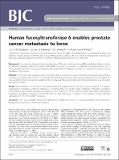| dc.contributor.author | Li, J | en_US |
| dc.contributor.author | Guillebon, A D | en_US |
| dc.contributor.author | Hsu, J-w | en_US |
| dc.contributor.author | Barthel, S R | en_US |
| dc.contributor.author | Dimitroff, C J | en_US |
| dc.contributor.author | Lee, Y-F | en_US |
| dc.contributor.author | King, M R | en_US |
| dc.date.accessioned | 2014-03-11T10:17:13Z | |
| dc.date.issued | 2013 | en_US |
| dc.identifier.citation | Li, J, A D Guillebon, J-w Hsu, S R Barthel, C J Dimitroff, Y-F Lee, and M R King. 2013. “Human fucosyltransferase 6 enables prostate cancer metastasis to bone.” British Journal of Cancer 109 (12): 3014-3022. doi:10.1038/bjc.2013.690. http://dx.doi.org/10.1038/bjc.2013.690. | en |
| dc.identifier.issn | 0007-0920 | en |
| dc.identifier.uri | http://nrs.harvard.edu/urn-3:HUL.InstRepos:11879355 | |
| dc.description.abstract | Background: The interaction between human prostate cancer (PCa) cells and bone marrow (BM) endothelium follows a rolling-and-adhesion cascade mediated by E-selectin ligand (ESL): E-selectin. This adhesion is enabled by elevated expression of α-1,3-fucosyltransferases (FTs), enzymes responsible for ESL-mediated bone metastasis in humans. In contrast, the incidence of bone metastasis in mice is rare. Methods: FT 3, 6 and 7 were overexpressed in mouse PCa cells. The rolling cell number, cell-rolling velocity and transendothelial migration were characterised in vitro. Fucosyltransferases-transduced mouse PCa cells expressing luciferase were inoculated into mice via left ventricle to compare the capability of bone metastasis. Mass spectrometry and immunoprecipitation were utilised for identification of ESLs. Results: Overexpression of FT3, FT6 or FT7 restored ESLs and enabled mouse PCa cells to roll and adhere in E-selectin-functionalised microtubes, similar to trafficking of circulating PCa cells in BM vessels. Following intracardiac inoculation, FT6-transduced cells induced robust bone metastasis in mice. Inhibition of FT6 by a fucose mimetic significantly reduced bone metastasis. Importantly, comparison of FT3, FT6 and FT7 gene expression in existing clinical samples showed significant upregulation of FT6 in PCa-distant metastases. Conclusion: FT6 is a key mediator of PCa cells trafficking to the BM. It may serve as a viable drug target in preclinical tests of therapeutics for reduction of PCa bone metastasis. | en |
| dc.language.iso | en_US | en |
| dc.publisher | Nature Publishing Group | en |
| dc.relation.isversionof | doi:10.1038/bjc.2013.690 | en |
| dc.relation.hasversion | http://www.ncbi.nlm.nih.gov/pmc/articles/PMC3859952/pdf/ | en |
| dash.license | LAA | en_US |
| dc.subject | fucosyltransferase | en |
| dc.subject | prostate cancer | en |
| dc.subject | E-selectin | en |
| dc.subject | homing | en |
| dc.subject | bone metastasis | en |
| dc.title | Human fucosyltransferase 6 enables prostate cancer metastasis to bone | en |
| dc.type | Journal Article | en_US |
| dc.description.version | Version of Record | en |
| dc.relation.journal | British Journal of Cancer | en |
| dc.date.available | 2014-03-11T10:17:13Z | |
| dc.identifier.doi | 10.1038/bjc.2013.690 | * |


